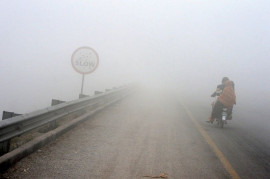
The overpowering smell of mustard growing in the fields welcomes all visitors to Akbarpura village. The 10-kilometre-long potholed link road leading here from Tarru Jabba on the Grand Trunk (GT) Road is lined with mustard and plum trees.
As one draws closer to the village, the smell of mustard is overpowered by the smell of death.
The shrine of the Akhund Panju Baba, where a blast killed 11 people and injured many more on Friday, is situated next to this road. A mosque, living quarters for local malangs, a graveyard and the shrine itself are situated inside an enclosure. To the right of the mosque are the living quarters, where a young boy is loudly chanting “sarkar ke ghulami main maut bhi qabool hai” (I am ready to die doing God’s work).
The dishevelled boy points towards a gate, which leads to the graveyard. There sits Zar Ali, all alone, crying.
“Even the Godless would not do what has been done to us,” he said.
Outside, local men and women were visiting the bombed mosque, clearing debris and making the necessary repairs.
Syed Shahenshah, the caretaker of the shrine, said, “We received no threats and the fact that that such an attack could occur never came to us, even in our wildest dreams.”
A relative of Shahenshah, Syed Farman Ali Shah told The Express Tribune that Hazrat Akhund Panju Baba’s shrine was around 475 years old. He said that the Baba was born in the Gagi Khan area of Swabi District, from where his parents migrated to the Choha Gujar area of the Peshawar.
“After his spiritual education, he was directed to go to Akbarpura, where he began spreading the Sufi message,” he said.
Farman said that Baba Jee established a huge seminary next to the mosque, from where over 300 students graduated every year and the langar (free food handouts) also date back to those days.
Khushmaqam Village, some two kilometres east of this shrine, was home to three of the dead and six of the injured. Two of those killed in the attack were young cousins who had gone to pray at the mosque.
The atmosphere here is fuelled by rage. “We ordinary people are not allowed to move with a knife in our pocket, yet these criminals can carry kilograms of explosives around and killing people with impunity,” said Momin Khan, whose son Wahid died in the attack.
Momin is angry at the authorities and says his family has been destroyed. “Our children, instead of blossoming like flowers, are decaying six-feet under. What have we done to deserve such an atrocity?”
His 25-year-old son Wahid was there for Friday prayers when he fell victim to the blast. Wahid later succumbed to his injuries at Lady Reading Hospital and was buried on Saturday.
Farhad Khan, whose son Jehandad, a 12th grader, was also killed in the blast, said that his son went to the shrine’s mosque for Friday prayers while he himself went to the village mosque. He said that he and his wife rushed to scene after hearing the blast.
“I did not find my son in the mosque and villagers told me that the injured had been shifted to the hospital. When I reached there, the doctors told me that he was being operated upon and sent me back home.”
Half an hour after he got home, his son’s body arrived. “Now I am left without a son,” he said, breaking into tears.
As mustard fields begin to blossom and plum trees welcome spring by turning green, life inside the village remains frozen in an endless winter.
Published in The Express Tribune, March 7th, 2011.










1734778885-0/Untitled-(10)1734778885-0-270x192.webp)






COMMENTS
Comments are moderated and generally will be posted if they are on-topic and not abusive.
For more information, please see our Comments FAQ